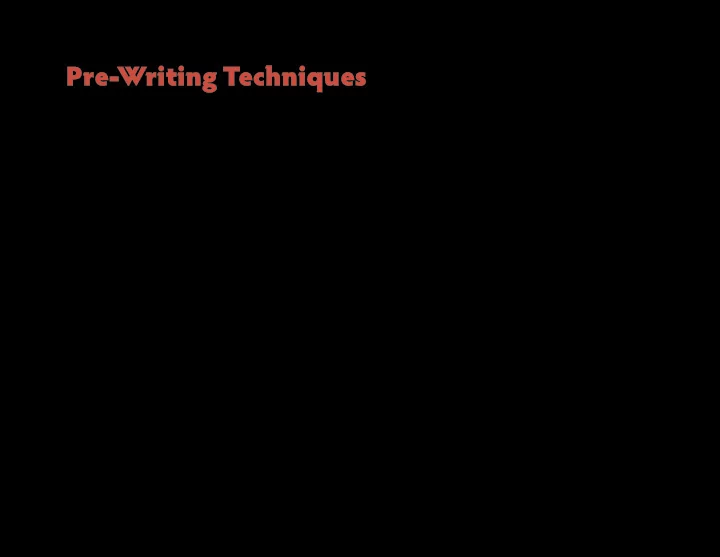

Pre-Writing Techniques rev ised 0 1.16.16 | | English 1301: Com position I || D. Glen Sm ith, instructor
Pre-Writing Techniques • Ideas need to be developed fi rst and then explored in detail. Pre-writing exercises help establish an idea before building the entire work. > free-write exercise > journal writing > listing > mapping / clustering / grouping > annotating texts and note taking (see Mortimer Adler’s essay “How to Mark a Book”) > blogging rev ised 0 1.16.16 | | English 1301: Com position I || D. Glen Sm ith, instructor 2
freew riting Freewriting is one quick exercise to help jar a writer’s imagination— likewise, it inhibits the negative reactions many people feel towards their own writing by triggering instinctive, reactionary impulses. • The overall concept requires the individual to simply write, without ever pausing for corrections or censoring of thoughts. • You keep writing for a series of ten or fi fteen minutes talking to yourself on the page, making random associations. • The Bedford Handbook editors state: Freewriting [...] lets you ask questions without feeling that you have to answer them. Sometimes a question that comes to mind at this stage will point you in an unexpected direction (16). • Another form of this type of prewriting is called focused freew riting . In this type of situation you center your words and impressions on a chosen subject. rev ised 0 1.16.16 | | English 1301: Com position I || D. Glen Sm ith, instructor 3
freew riting Peter Elbow, a published instructor of writing, notes in his essay “Freewriting” that by listening to the critical voice in your head, and not paying attention to your instincts, results in an individual locking him/ herself into an angry cycle of revision and rewriting, rather than getting words down on the page. He declares that: premature editing doesn’t just make writing hard. It also makes writing dead. You voice is damped out by all the interruptions, changes and hesitations between the consciousness and the page. In your natural way of producing words there is a sound, a texture, a rhythm— a voice— which is the main source of power in your writing. I don’t know how it works, but this voice is the force that will make a reader listen to you, the energy that drives the meanings through his thick skull. (70) Elbow, Peter. “Freewriting.” The Arlington Reader. Third ed. Lynn Bloom and Louise Smith, eds., Boston: Bedford/ St. Martin. 2011. Print. rev ised 0 1.16.16 | | English 1301: Com position I || D. Glen Sm ith, instructor 4
Journal Writing Keeping a journal: This is another method allowing you to talk to yourself, primarily, through the pages of a notebook. • you develop the restrictions or the formula • record highlights of day to day events • generate notes and ideas for possible future writing • practice techniques with your writing style • create meditation exercises / word games • show a writer’s concepts and experiments: a record of intentions left behind As already mentioned, you will be building a Reading Journal throughout this class. rev ised 0 1.16.16 | | English 1301: Com position I || D. Glen Sm ith, instructor 5
Locus Com m unis In English, the Latin phrase Locus com m unis m eans com m onplace. In terms of writing and history, the phrase represents a commonplace book, or scrapbook, which compiled various ideas, poems, informational scraps and sayings, all following a common, general theme. • “a place to collect common items or thoughts.” • developed in the early history of Europe before printed books were commonplace items for the average person • in some ways, these books proved the intellect of the owner • in the same fashion, a large, personal library proved how well-read an individual was, how intellectual, and how wealthy Your reading journal acts as a com m onplace book. A good resource for m ore inform a tion ca n be found a t: http:/ / www.squidoo.com/ commonplace-books rev ised 0 1.16.16 | | English 1301: Com position I || D. Glen Sm ith, instructor 6
Recommend
More recommend